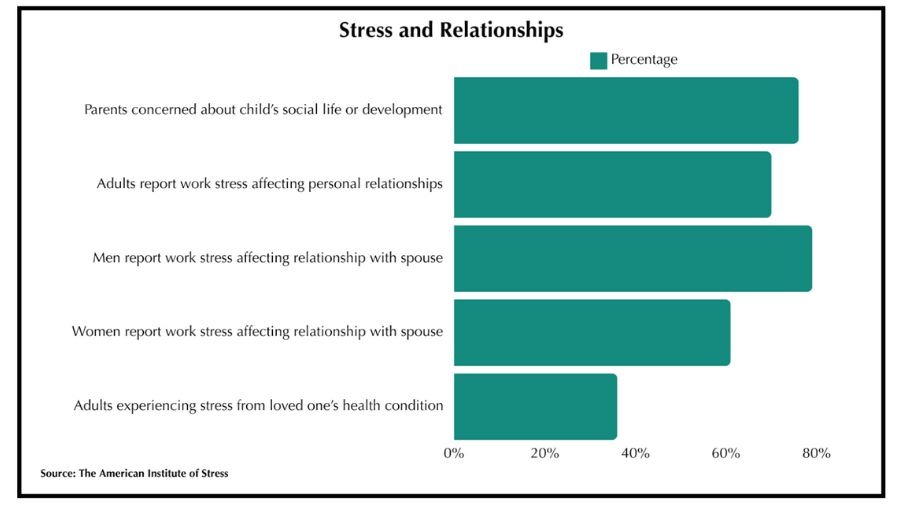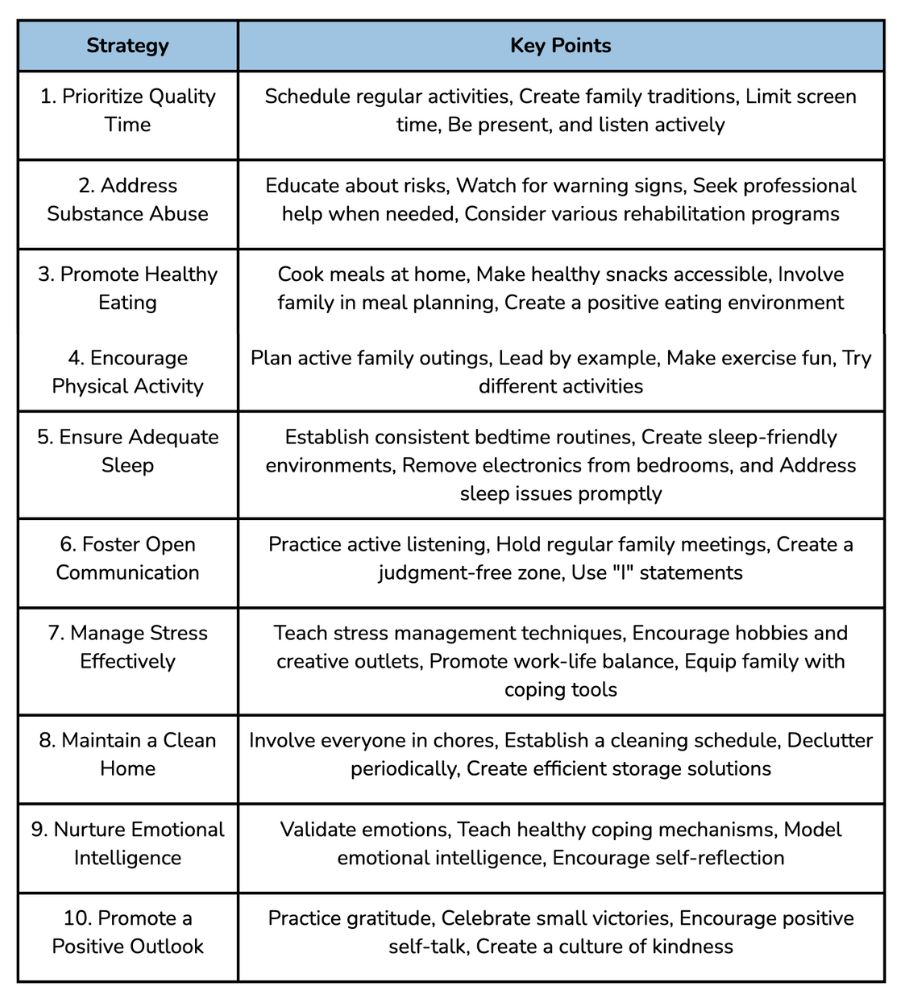Hey there, Mama! Are you finding it tough to keep your family healthy and happy? Trust me, you’re not alone. So many of us parents worry about this every single day. From those never-ending communication struggles to the stress that just won’t quit, and even the big, scary stuff like substance abuse, our families face a lot of challenges.

But guess what? There’s hope. This guide is packed with down-to-earth, practical tips to help you nurture your family’s physical and emotional well-being. We’ll dive into simple yet super effective ways to create a joyful and loving home, even when things get tough. Let’s tackle these common family hurdles together and bring a little more joy and health into our homes!
Contents
- 1 Prioritize Quality Time Together
- 2 Promoting Family Health
- 3 Promote Healthy Eating Habits
- 4 Encourage Family Exercise
- 5 Prioritize Adequate Sleep
- 6 Foster Open Communication
- 7 Manage Stress Effectively
- 8 Maintain a Clean and Organized Home
- 9 Nurture Emotional Intelligence
- 10 Promote a Positive Outlook
- 11 Frequently Asked Questions
Prioritize Quality Time Together
Let’s talk about something super important—quality time with the family. It’s the secret sauce that strengthens those family bonds we cherish so much. Think about scheduling regular activities like game nights, weekend outings, or just sharing meals together without the constant buzz of distractions. Consistency and being truly engaged are key here.
Try limiting screen time to really encourage those heart-to-heart conversations. And how about creating some fun family traditions that everyone looks forward to? Holiday rituals or annual vacations can become those cherished moments that build lasting memories.
Remember, it’s all about the quality of your interactions, not the quantity. Be present, listen actively, and show genuine interest in what’s going on in each other’s lives. When you prioritize quality time, you’re laying down the foundation for strong family relationships and emotional well-being.
Promoting Family Health
Keeping our families healthy is no small feat, especially with all the challenges we face, like stress and wellness issues. It’s super important to educate everyone about potential health risks, including things like substance use. Keep an eye out for warning signs like changes in behavior or a drop in performance, and don’t hesitate to seek professional help if needed.
There are so many treatment options out there. For instance, outpatient programs let individuals keep up with their daily routines while getting the support they need. Intensive outpatient programs (IOP) are great too, offering frequent sessions while allowing patients to stay at home with their families.
Remember, family support is absolutely essential for a successful recovery. Ongoing care, like continued counseling and support groups, helps maintain health and prevent relapse. We’ve got to be there for each other, every step of the way.
Promote Healthy Eating Habits
Good nutrition is a cornerstone of family’s complete health, and cooking meals at home is a great way to control ingredients and teach those invaluable culinary skills. Keep healthy snacks like fruits, veggies, and nuts within easy reach so they’re the go-to option for everyone.
Get the whole family involved in meal planning and preparation to spark interest in nutritious foods. Trying out something new like a healthy breakfast cookie recipe together can turn cooking into a fun family activity. Plus, it’s a great way to educate everyone about the benefits of different foods.
Create a positive eating environment by sharing meals together without the distractions of screens. Remember, the healthy eating habits we nurture in our kiddos today often stick with them for life, paving the way for long-term health, well-being, and improved gut health.
Encourage Family Exercise
Making it a family affair can be so much fun! Think about active outings like family bike rides, nature walks, or even spontaneous dance parties in the living room. Joining local recreational leagues can also be a great way to get everyone moving together.
Lead by example, because when kids see their parents prioritizing getting fit, they’re more likely to do the same. Encourage outdoor play and try to limit those sedentary activities. Make exercise fun with games or friendly challenges, and explore different activities to find what everyone enjoys the most.
Remember, physical activity isn’t just about structured exercise. Household chores, gardening, and playing with pets all count too. Keep moving and make it enjoyable for the whole family.
Prioritize Adequate Sleep
Establishing consistent bedtime routines for everyone helps regulate those internal clocks and boosts sleep quality. Create a sleep-friendly environment by keeping bedrooms dark, quiet, and at a comfy temperature. And let’s be real, removing electronic devices from the bedroom can work wonders to minimize disruptions.
Encourage relaxing pre-sleep activities like reading or gentle stretching to help everyone wind down. Be mindful of caffeine intake, especially later in the day. If anyone in the family is struggling with sleep issues, address them promptly to avoid chronic sleep deprivation.
Good sleep habits benefit the entire family, improving mood, concentration, and overall well-being.
Foster Open Communication
This is super important! Create a home where everyone feels comfortable sharing their thoughts and feelings. Start by practicing active listening—give your full attention, show genuine interest, and ask thoughtful questions. Validate their feelings to encourage open and honest dialogue.
Regular family meetings can be a great way to discuss concerns, celebrate achievements, and plan fun activities. It’s all about giving everyone a chance to be heard. Create a judgment-free zone where sharing is safe and free from criticism.
Use “I” statements to express your feelings and encourage others to do the same. Remember, effective communication is the cornerstone of strong family relationships and emotional health.
Manage Stress Effectively

Introduce simple relaxation techniques like deep breathing or taking a few quiet moments in prayer, seeking the peace of God. Encourage hobbies and creative outlets as healthy ways to relieve stress.
Create a supportive environment where everyone feels comfortable discussing their worries and stressors. Teach problem-solving skills to help tackle the root causes of stress. Remind your family to give their worries to God, trusting in His peace and guidance. Promote a healthy work-life/school-life balance and emphasize the importance of self-care.
Remember, how we handle stress greatly influences our overall well-being and family dynamics. Equipping your family with these stress management tools and the peace of God can lead to a happier, healthier home environment.
Maintain a Clean and Organized Home
Get the whole family involved in household chores with age-appropriate tasks. It’s a great way to teach responsibility and teamwork. Set up a regular cleaning schedule to keep things manageable and prevent tasks from piling up.
Don’t forget to maintain and clean appliances like coffee makers, toasters, and more. Regularly cleaning these items ensures they function properly and last longer, while also contributing to the overall cleanliness of your kitchen.
Make decluttering a periodic habit, letting go of unused items to create a more open and peaceful space. A clutter-free environment can really clear the mind. Create efficient storage solutions to help everyone stay organized.
Remember, a clean and organized home provides a calm, comfortable space for family life. It also sets a positive example for our kiddos about the importance of maintaining our environment and taking pride in our living spaces.
Nurture Emotional Intelligence
Let’s talk about helping our family members understand and manage their emotions for healthier relationships. Start by validating their emotions—acknowledge their feelings without judgment. This creates an environment of understanding and support. Teach healthy coping mechanisms for dealing with difficult emotions, like journaling or engaging in physical activity.
Model emotional intelligence by expressing your feelings appropriately and showing empathy towards others. Encourage self-reflection and self-awareness. Help your family members identify and name their emotions so they can better understand what they’re feeling.
As Christians, remember that we aren’t led by our five physical senses and we shouldn’t let our emotions rule us. Encourage your family to be led by their spirit, seeking God’s guidance in all things. Emotional intelligence is key to personal and social success. By nurturing this skill, you’re equipping your family with the tools for better communication, conflict resolution, and overall happiness.
Promote a Positive Outlook
Make it a habit to share things you’re thankful for during meals or before bedtime. Celebrating small victories and acknowledging accomplishments can reinforce positive behavior and boost self-esteem.
Encourage positive self-talk and help your family reframe negative situations in a constructive way. Create a culture of kindness and appreciation within your home. Remind everyone that a positive outlook helps us navigate challenges more effectively and enjoy life’s blessings to the fullest.
By fostering positivity, you’re creating a supportive, uplifting family environment that can weather difficulties and celebrate joy together.

By implementing these strategies, you’re taking important steps towards a healthier, happier family life. Remember, perfection isn’t the goal—progress is. Be patient with yourself and your loved ones as you work together to create positive changes.
With consistency and love, you can build a strong, resilient family that weathers life’s challenges and celebrates its joys. Your efforts today will shape a brighter, more harmonious future for your family. Keep going, Mama—you’re making a beautiful difference!
Frequently Asked Questions
How can we make family meals more enjoyable and meaningful?
Try sharing the highlights of the day, playing conversation games, or discussing interesting topics. Ban devices at the table and focus on truly enjoying each other’s company.
What are some ways to help children develop resilience?
Encourage them to face age-appropriate challenges and teach them to reframe setbacks as valuable learning opportunities. Praise their effort over the results and model resilience in your own behavior.
By showing them how to handle difficulties with grace and determination, you’re helping them build the skills they need to navigate life’s ups and downs.
How can we maintain family traditions while adapting to changing circumstances?
Be flexible with the timing or format while preserving the core purpose of these cherished moments. Create new traditions that fit your current lifestyle, and involve your family in updating or reimagining them.
By keeping traditions meaningful and relevant, you’re strengthening those family bonds and creating lasting memories.
For more homeschooling inspiration, tips and encouragement, make sure to follow KFH on Facebook, Pinterest, Instagram and Twitter, and subscribe to our Newsletter for some FREE GOODIES!
Forest Rose is a God Loving, Blessed Wife, & Mama to 3 girls. She’s passionate about lifting moms out of the trenches that are discouraged, overwhelmed, or feeling alone or isolated. Her hope is to point them to Christ and equip them to rise up with a newfound hope and joy within, that He alone can provide. Besides blogging, she also loves to create printables!




Leave a Reply